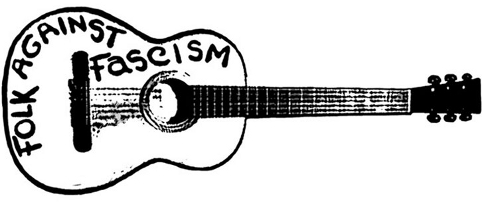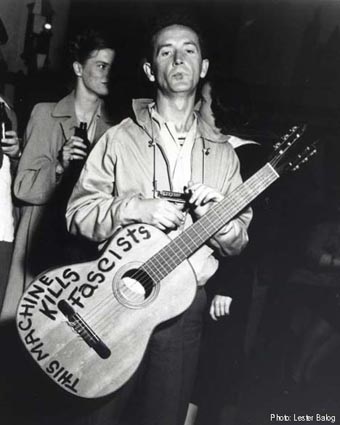Despite the leader of the British National Party (BNP), Nick Gri₤₤in, famously calling England ‘a slum’, he claims to love English folk music and has revealed that he intends to launch his own ‘folk’ radio show. But, as with all politicians, he appears to have a hidden agenda.
This weekend the BBC revealed how the BNP used one of Steve Knightly‘s songs, ‘Roots’, to raise money for their extreme right political party without his consent. When Steve discovered that one of his songs was being used on the BNP website he said…
“It’s a betrayal of your invention, you feel violated. We try to make music that’s inclusive. And when organisations like the BNP come along and say ‘this music is ours, this isn’t for black people or Jewish people or whatever’ – that’s a betrayal of what you’ve been working for.”
One of Folk Music’s brightest stars, Jon Boden, has also had found his music being taken out of context by the BNP. Along with many (many…) other projects, Jon performs with Bellowhead – the best live music act in the world!!! – and is currently one of the most influential men in British folk music, but he has found that this cannot protect his work from being misappropriated. Jon recorded several tracks for a folk album that he was told would be sold through gift shops, but he was shocked to find that it went on sale to raise money for the BNP. He says…
“The CD was titled ‘A Place Called England’, but suddenly when you see it on the BNP’s website, it takes on a darker significance that you never imagined.”
The problem is that artists have a very limited say about where and how their recorded music is used. So a new initiative is hoping to put an end to the misappropriation of British folk music. ‘Folk Against Fascism (FAF)‘ (the site should be up and running in September, but you can already join the mailing list or their Facebook group) was officially launched at Sidmouth Folk Festival last week. They hope to encourage musicians to include their logo on their CDs to make it awkward for far-right parties to sell the music or to use it for promoting their causes.

FAF’s logo is, of course, modelled on Woody Guthrie’s famous guitar…

Guthrie knew the power of music and so does FAF’s founder, Joan Crump, who says…
“Music has been a very powerful political tool, usually for the left. What concerns me is that the BNP could do the same thing from a far-right perspective.”
The BNP are said to be looking for a ‘musical soundtrack’ which will help rally people to their cause. I sincerely hope that FAF can ensure that the BNP don’t hijack folk music for these ends, but I fear that simply labelling the BNP and the far-right as ‘fascist’ may not be enough to defend the music I love. As RedStarCommando‘s blog post ‘Give Up Anti-Fascism‘ shows it hasn’t been enough to stop them with regard to elections.
FAF is an important step forward, but if it is to be truly effective it must endeavour to educate people about the real history of folk in general and British folk in particular.
Most folk music is inspired by the working class’ struggle against the oppressive forces of the wealthy and the powerful and is therefore inherently anti-fascist. Writing in The Guardian recently Marek Kohn said…
Whereas folkish nationalism sees folk music as the culture of a people, some of the most influential strands in revived and reworked folk music have seen folk songs as the culture of “the people”, a group defined in opposition to their lords and masters, rather than to counterparts in other lands. The idea of connecting with the people still strikes chords – and folk’s substantial communist heritage still seems to be regarded as perfectly unproblematic.
But like so many on the left he underplays the importance of a shared cultural history. Interestingly enough he also quoted Steve Knightley who urges the English to “rediscover … their musical identity” because “we need roots”, but responds…
Do we really, though? We need depth and we need substance, but we are not plants. At different times different peoples may need the strength that their roots give them, but at this point in history the English scarcely lack sources of support or enrichment. We enjoy affluence and access to knowledge far beyond the imaginations of those unknowns who created the ballads of the British folk canon.
Apart from ignoring the facts that Britain remains one of the most class divided societies on the planet and that high levels of affluence have brought equally high levels of anxiety, depression and suicide thanks largely to the alienating nature of our rootless consumer existence; this statement reflects a widely held feeling on the left that the cultural history of a country should be abandoned for fear that any positive statement could be confused with ardent nationalism.
But anyone who bothers to look at the real, everyday history of the English working class will find a tradition to be – dare I say it… – proud of.
History, as Alex Haley famously said, “is written by the winners” and English history is usually presented as a list of Kings and Queens which begins in 1066 and peaks with the Victorian imperialism of the British Empire. But this is the history of a privileged and the powerful elite. The real history and culture of England is enshrined by tales (both factual and mythical – i.e. folklore) of everyday people who have stood up to excesses and abuses of power in favour of the Liberties of England as enshrined by Magna Carta (which, as Peter Linebaugh demonstrates in his groundbreaking The Magna Carta Manifesto: Liberty & Commons for All, remain of global importance).
England is the home of Robin Hood and ‘Freeborn’ John Lilburne; Ned Ludd and Wat Tyler; Captain Swing and Bartholomew Steer. An overwhelming number of our popular histories, myths and legends contain within them the core English values of liberty, solidarity, collectivism, mutuality, political radicalism, social justice and self-determinism. We would do ourselves an immense disservice if we were to disregard such a rich cultural heritage in the name of ideology or, worse still, political correctness.
Instead folklorists, historians and musicians should endeavour to present a more balanced view of English history, culture and tradition; one that celebrates the English working class and the Liberties of England. As I attempted to show with regard to the issue of ‘blacking‘ in Border Morris, a deeper understanding of our traditions is the best weapon against fear, hatred and ignorance.
Music may indeed be a powerful tool; but so is knowledge.
Further reading
George Orwell ‘Essays‘
The essays of George Orwell may have been written over 60 years ago, but they remain relevant to the ‘English experience’ and manage to balance a love of England with a hatred of ardent nationalism. Of particular interest to this article would be The Lion & The Unicorn, My Country Left or Right and Notes On Nationalism.
E. P. Thompson ‘The Making of the English Working Class‘
The book that revolutionised our understanding of English social history.
Paul Kingsnorth ‘Real England‘
Paul Kingsnorth searches for an English cultural and political identity which is based on ‘being’ rather than ‘belonging’, or, as Paul says, “a new type of patriotism, benign and positive, based on place not race, geography not biology.”
The blog for Paul’s book can be found here


3 comments
Comments feed for this article
August 10, 2009 at 9:40 pm
taly
will music kill the fascist european union? we also have an establishment that denies the existence of millions of English people, will it kill them?
August 11, 2009 at 10:45 am
Wynfrið Wynn
Yes, your right, the EU has definitely become more fascist with the addition of Nick Griffin and Andrew Brons 😉
Only kidding! But your comments have nothing to do with the points I’m trying to raise in this article.
Keeping fascism out of folk music will not help secure a much needed English parliament or combat the excesses of the centralised, undemocratic EU; but then neither will adding a few quid to Nick Griffin’s cash cow.
August 11, 2009 at 1:44 pm
THE ENGLISH REBEL – wherefore art thou in this our time of need? «
[…] | Tags: culture, england, english rebel, liberty, Politics, rebellion, revolt, thoughts Yesterday I said… anyone who bothers to look at the real, everyday history of the English working class […]